Literature Review: Emotional Intelligence and Leadership Performance
VerifiedAdded on 2020/03/04
|6
|1434
|70
Literature Review
AI Summary
This literature review analyzes several articles exploring the significance of emotional intelligence (EI) in leadership. The review examines the relationship between EI, self-efficacy, and leadership effectiveness, particularly within the police sector, highlighting the importance of these traits for effective leadership. It also explores how EI, self-leadership, and stress coping are interconnected, emphasizing their importance for students and professionals. The review further investigates the practical applications of EI, its influence on team performance, and its role in fostering career adaptability among employees. Studies emphasize that leaders should develop their emotional intelligence to improve team performance and organizational success. The review concludes that emotional intelligence is a critical factor in leadership development, influencing cognition, motivation, and interpersonal relationships, which ultimately impact leadership effectiveness.
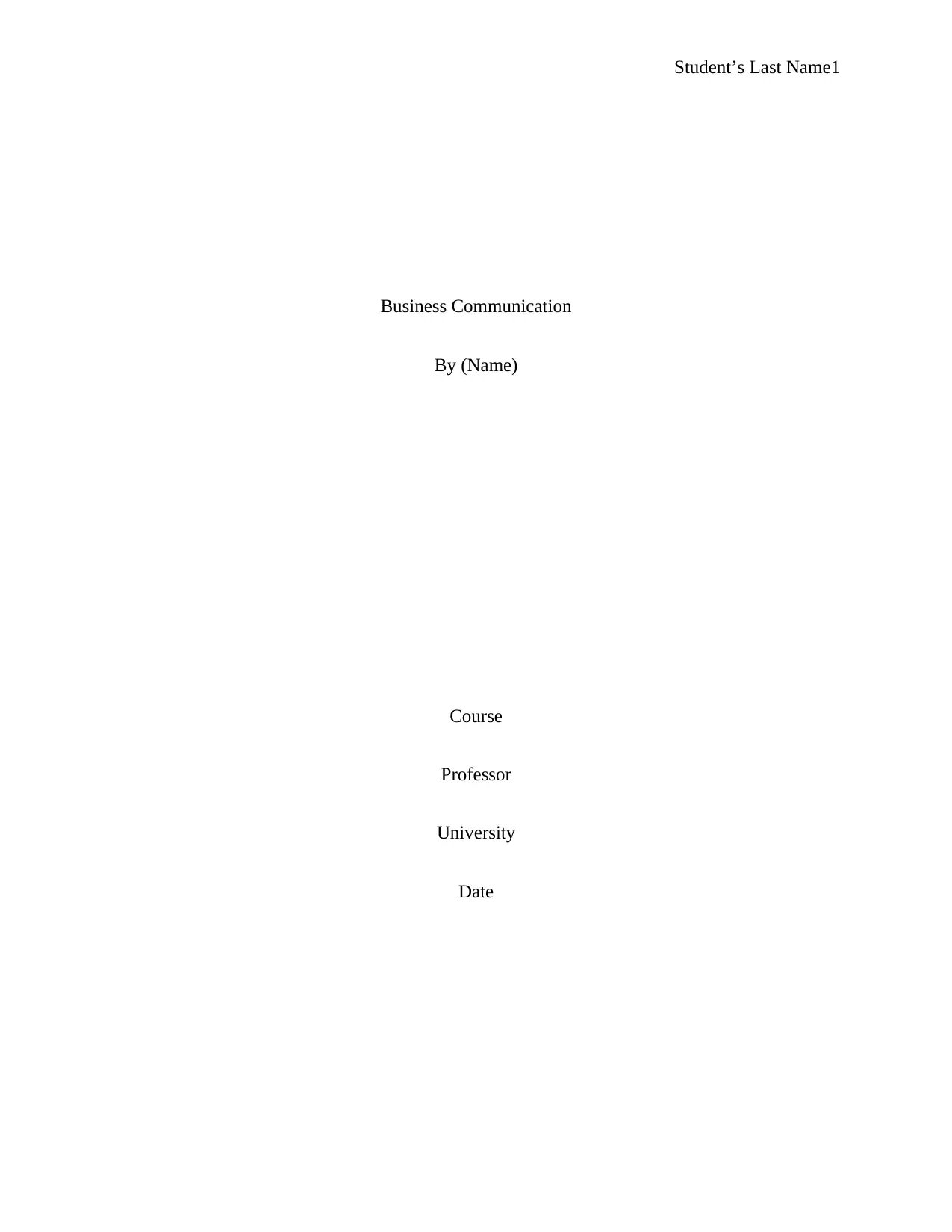
Student’s Last Name1
Business Communication
By (Name)
Course
Professor
University
Date
Business Communication
By (Name)
Course
Professor
University
Date
Paraphrase This Document
Need a fresh take? Get an instant paraphrase of this document with our AI Paraphraser
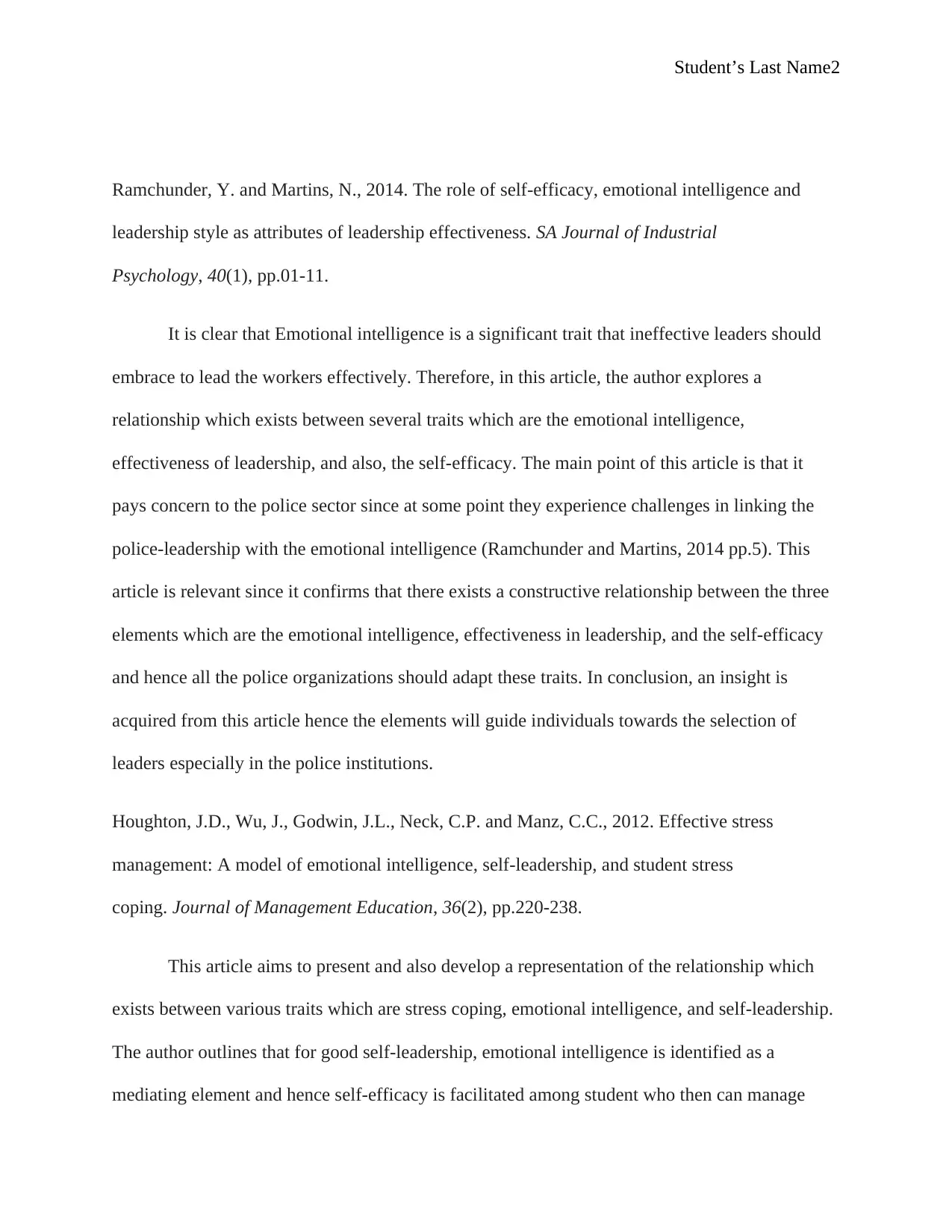
Student’s Last Name2
Ramchunder, Y. and Martins, N., 2014. The role of self-efficacy, emotional intelligence and
leadership style as attributes of leadership effectiveness. SA Journal of Industrial
Psychology, 40(1), pp.01-11.
It is clear that Emotional intelligence is a significant trait that ineffective leaders should
embrace to lead the workers effectively. Therefore, in this article, the author explores a
relationship which exists between several traits which are the emotional intelligence,
effectiveness of leadership, and also, the self-efficacy. The main point of this article is that it
pays concern to the police sector since at some point they experience challenges in linking the
police-leadership with the emotional intelligence (Ramchunder and Martins, 2014 pp.5). This
article is relevant since it confirms that there exists a constructive relationship between the three
elements which are the emotional intelligence, effectiveness in leadership, and the self-efficacy
and hence all the police organizations should adapt these traits. In conclusion, an insight is
acquired from this article hence the elements will guide individuals towards the selection of
leaders especially in the police institutions.
Houghton, J.D., Wu, J., Godwin, J.L., Neck, C.P. and Manz, C.C., 2012. Effective stress
management: A model of emotional intelligence, self-leadership, and student stress
coping. Journal of Management Education, 36(2), pp.220-238.
This article aims to present and also develop a representation of the relationship which
exists between various traits which are stress coping, emotional intelligence, and self-leadership.
The author outlines that for good self-leadership, emotional intelligence is identified as a
mediating element and hence self-efficacy is facilitated among student who then can manage
Ramchunder, Y. and Martins, N., 2014. The role of self-efficacy, emotional intelligence and
leadership style as attributes of leadership effectiveness. SA Journal of Industrial
Psychology, 40(1), pp.01-11.
It is clear that Emotional intelligence is a significant trait that ineffective leaders should
embrace to lead the workers effectively. Therefore, in this article, the author explores a
relationship which exists between several traits which are the emotional intelligence,
effectiveness of leadership, and also, the self-efficacy. The main point of this article is that it
pays concern to the police sector since at some point they experience challenges in linking the
police-leadership with the emotional intelligence (Ramchunder and Martins, 2014 pp.5). This
article is relevant since it confirms that there exists a constructive relationship between the three
elements which are the emotional intelligence, effectiveness in leadership, and the self-efficacy
and hence all the police organizations should adapt these traits. In conclusion, an insight is
acquired from this article hence the elements will guide individuals towards the selection of
leaders especially in the police institutions.
Houghton, J.D., Wu, J., Godwin, J.L., Neck, C.P. and Manz, C.C., 2012. Effective stress
management: A model of emotional intelligence, self-leadership, and student stress
coping. Journal of Management Education, 36(2), pp.220-238.
This article aims to present and also develop a representation of the relationship which
exists between various traits which are stress coping, emotional intelligence, and self-leadership.
The author outlines that for good self-leadership, emotional intelligence is identified as a
mediating element and hence self-efficacy is facilitated among student who then can manage
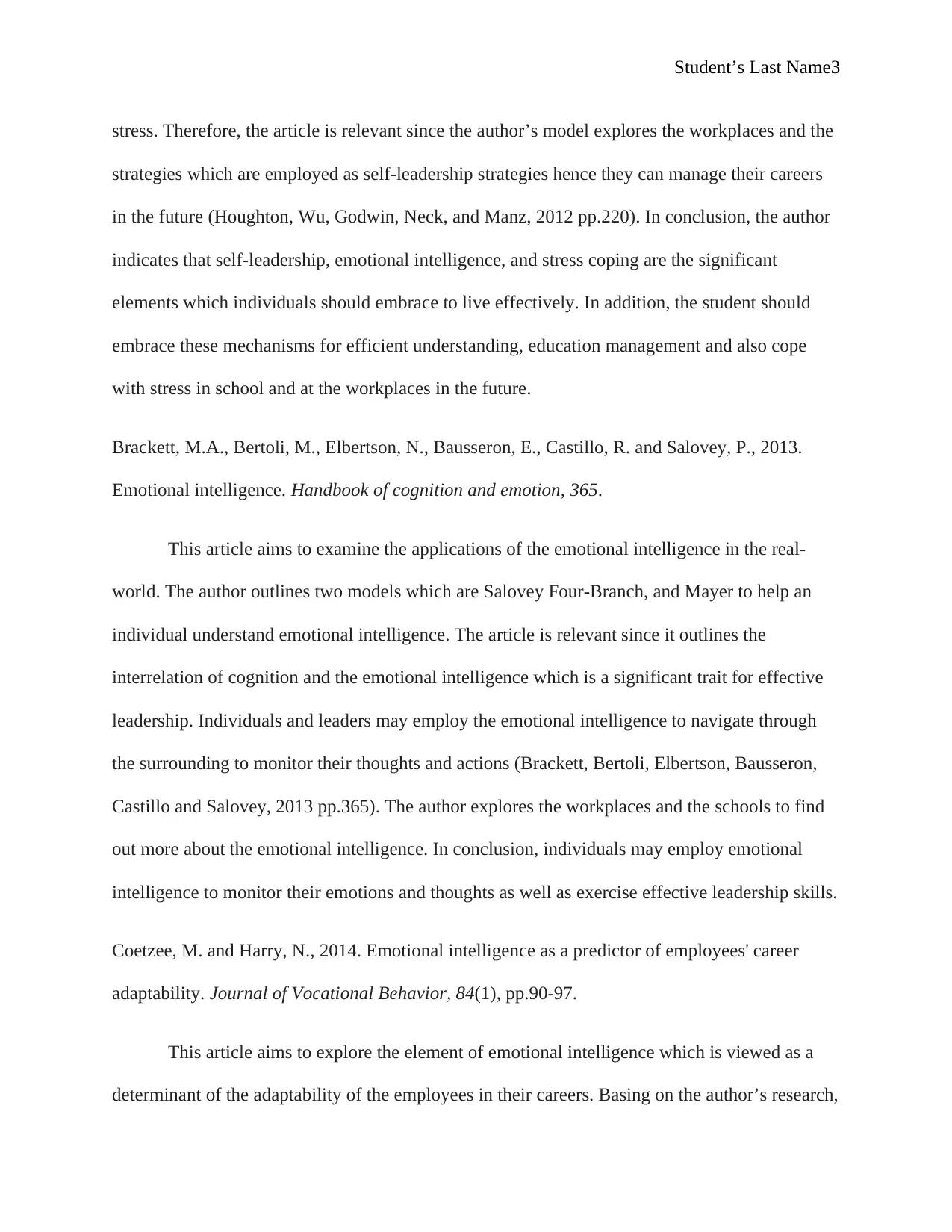
Student’s Last Name3
stress. Therefore, the article is relevant since the author’s model explores the workplaces and the
strategies which are employed as self-leadership strategies hence they can manage their careers
in the future (Houghton, Wu, Godwin, Neck, and Manz, 2012 pp.220). In conclusion, the author
indicates that self-leadership, emotional intelligence, and stress coping are the significant
elements which individuals should embrace to live effectively. In addition, the student should
embrace these mechanisms for efficient understanding, education management and also cope
with stress in school and at the workplaces in the future.
Brackett, M.A., Bertoli, M., Elbertson, N., Bausseron, E., Castillo, R. and Salovey, P., 2013.
Emotional intelligence. Handbook of cognition and emotion, 365.
This article aims to examine the applications of the emotional intelligence in the real-
world. The author outlines two models which are Salovey Four-Branch, and Mayer to help an
individual understand emotional intelligence. The article is relevant since it outlines the
interrelation of cognition and the emotional intelligence which is a significant trait for effective
leadership. Individuals and leaders may employ the emotional intelligence to navigate through
the surrounding to monitor their thoughts and actions (Brackett, Bertoli, Elbertson, Bausseron,
Castillo and Salovey, 2013 pp.365). The author explores the workplaces and the schools to find
out more about the emotional intelligence. In conclusion, individuals may employ emotional
intelligence to monitor their emotions and thoughts as well as exercise effective leadership skills.
Coetzee, M. and Harry, N., 2014. Emotional intelligence as a predictor of employees' career
adaptability. Journal of Vocational Behavior, 84(1), pp.90-97.
This article aims to explore the element of emotional intelligence which is viewed as a
determinant of the adaptability of the employees in their careers. Basing on the author’s research,
stress. Therefore, the article is relevant since the author’s model explores the workplaces and the
strategies which are employed as self-leadership strategies hence they can manage their careers
in the future (Houghton, Wu, Godwin, Neck, and Manz, 2012 pp.220). In conclusion, the author
indicates that self-leadership, emotional intelligence, and stress coping are the significant
elements which individuals should embrace to live effectively. In addition, the student should
embrace these mechanisms for efficient understanding, education management and also cope
with stress in school and at the workplaces in the future.
Brackett, M.A., Bertoli, M., Elbertson, N., Bausseron, E., Castillo, R. and Salovey, P., 2013.
Emotional intelligence. Handbook of cognition and emotion, 365.
This article aims to examine the applications of the emotional intelligence in the real-
world. The author outlines two models which are Salovey Four-Branch, and Mayer to help an
individual understand emotional intelligence. The article is relevant since it outlines the
interrelation of cognition and the emotional intelligence which is a significant trait for effective
leadership. Individuals and leaders may employ the emotional intelligence to navigate through
the surrounding to monitor their thoughts and actions (Brackett, Bertoli, Elbertson, Bausseron,
Castillo and Salovey, 2013 pp.365). The author explores the workplaces and the schools to find
out more about the emotional intelligence. In conclusion, individuals may employ emotional
intelligence to monitor their emotions and thoughts as well as exercise effective leadership skills.
Coetzee, M. and Harry, N., 2014. Emotional intelligence as a predictor of employees' career
adaptability. Journal of Vocational Behavior, 84(1), pp.90-97.
This article aims to explore the element of emotional intelligence which is viewed as a
determinant of the adaptability of the employees in their careers. Basing on the author’s research,
⊘ This is a preview!⊘
Do you want full access?
Subscribe today to unlock all pages.

Trusted by 1+ million students worldwide
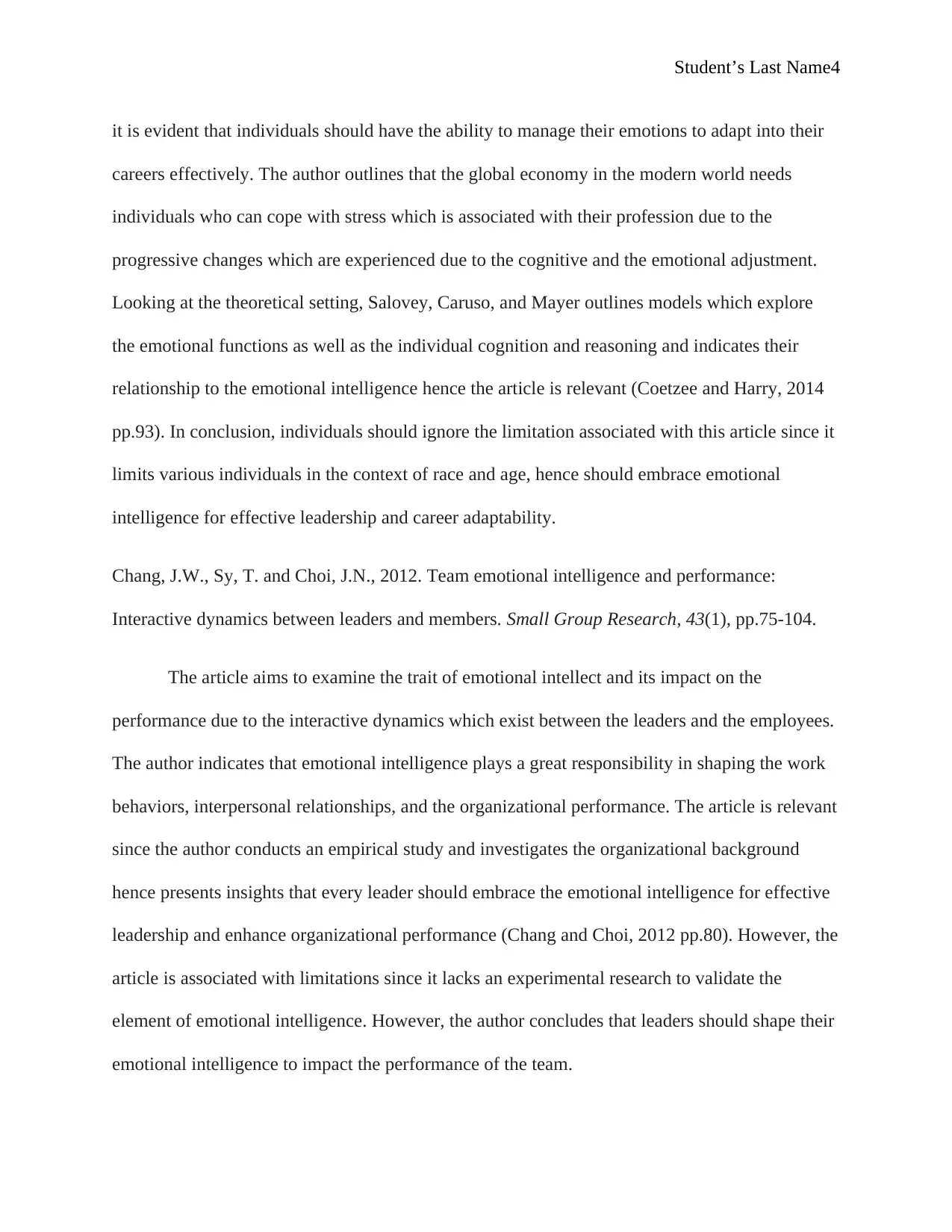
Student’s Last Name4
it is evident that individuals should have the ability to manage their emotions to adapt into their
careers effectively. The author outlines that the global economy in the modern world needs
individuals who can cope with stress which is associated with their profession due to the
progressive changes which are experienced due to the cognitive and the emotional adjustment.
Looking at the theoretical setting, Salovey, Caruso, and Mayer outlines models which explore
the emotional functions as well as the individual cognition and reasoning and indicates their
relationship to the emotional intelligence hence the article is relevant (Coetzee and Harry, 2014
pp.93). In conclusion, individuals should ignore the limitation associated with this article since it
limits various individuals in the context of race and age, hence should embrace emotional
intelligence for effective leadership and career adaptability.
Chang, J.W., Sy, T. and Choi, J.N., 2012. Team emotional intelligence and performance:
Interactive dynamics between leaders and members. Small Group Research, 43(1), pp.75-104.
The article aims to examine the trait of emotional intellect and its impact on the
performance due to the interactive dynamics which exist between the leaders and the employees.
The author indicates that emotional intelligence plays a great responsibility in shaping the work
behaviors, interpersonal relationships, and the organizational performance. The article is relevant
since the author conducts an empirical study and investigates the organizational background
hence presents insights that every leader should embrace the emotional intelligence for effective
leadership and enhance organizational performance (Chang and Choi, 2012 pp.80). However, the
article is associated with limitations since it lacks an experimental research to validate the
element of emotional intelligence. However, the author concludes that leaders should shape their
emotional intelligence to impact the performance of the team.
it is evident that individuals should have the ability to manage their emotions to adapt into their
careers effectively. The author outlines that the global economy in the modern world needs
individuals who can cope with stress which is associated with their profession due to the
progressive changes which are experienced due to the cognitive and the emotional adjustment.
Looking at the theoretical setting, Salovey, Caruso, and Mayer outlines models which explore
the emotional functions as well as the individual cognition and reasoning and indicates their
relationship to the emotional intelligence hence the article is relevant (Coetzee and Harry, 2014
pp.93). In conclusion, individuals should ignore the limitation associated with this article since it
limits various individuals in the context of race and age, hence should embrace emotional
intelligence for effective leadership and career adaptability.
Chang, J.W., Sy, T. and Choi, J.N., 2012. Team emotional intelligence and performance:
Interactive dynamics between leaders and members. Small Group Research, 43(1), pp.75-104.
The article aims to examine the trait of emotional intellect and its impact on the
performance due to the interactive dynamics which exist between the leaders and the employees.
The author indicates that emotional intelligence plays a great responsibility in shaping the work
behaviors, interpersonal relationships, and the organizational performance. The article is relevant
since the author conducts an empirical study and investigates the organizational background
hence presents insights that every leader should embrace the emotional intelligence for effective
leadership and enhance organizational performance (Chang and Choi, 2012 pp.80). However, the
article is associated with limitations since it lacks an experimental research to validate the
element of emotional intelligence. However, the author concludes that leaders should shape their
emotional intelligence to impact the performance of the team.
Paraphrase This Document
Need a fresh take? Get an instant paraphrase of this document with our AI Paraphraser
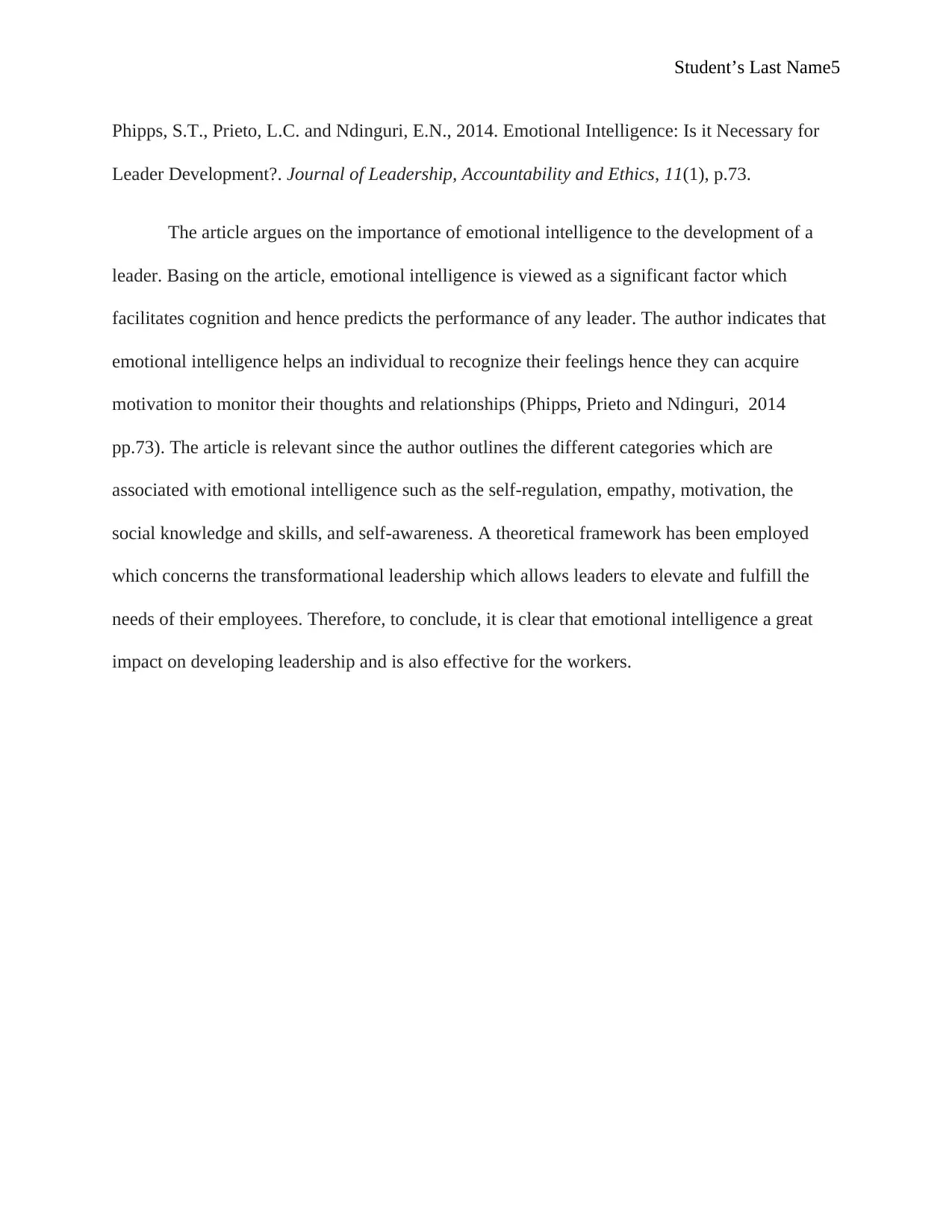
Student’s Last Name5
Phipps, S.T., Prieto, L.C. and Ndinguri, E.N., 2014. Emotional Intelligence: Is it Necessary for
Leader Development?. Journal of Leadership, Accountability and Ethics, 11(1), p.73.
The article argues on the importance of emotional intelligence to the development of a
leader. Basing on the article, emotional intelligence is viewed as a significant factor which
facilitates cognition and hence predicts the performance of any leader. The author indicates that
emotional intelligence helps an individual to recognize their feelings hence they can acquire
motivation to monitor their thoughts and relationships (Phipps, Prieto and Ndinguri, 2014
pp.73). The article is relevant since the author outlines the different categories which are
associated with emotional intelligence such as the self-regulation, empathy, motivation, the
social knowledge and skills, and self-awareness. A theoretical framework has been employed
which concerns the transformational leadership which allows leaders to elevate and fulfill the
needs of their employees. Therefore, to conclude, it is clear that emotional intelligence a great
impact on developing leadership and is also effective for the workers.
Phipps, S.T., Prieto, L.C. and Ndinguri, E.N., 2014. Emotional Intelligence: Is it Necessary for
Leader Development?. Journal of Leadership, Accountability and Ethics, 11(1), p.73.
The article argues on the importance of emotional intelligence to the development of a
leader. Basing on the article, emotional intelligence is viewed as a significant factor which
facilitates cognition and hence predicts the performance of any leader. The author indicates that
emotional intelligence helps an individual to recognize their feelings hence they can acquire
motivation to monitor their thoughts and relationships (Phipps, Prieto and Ndinguri, 2014
pp.73). The article is relevant since the author outlines the different categories which are
associated with emotional intelligence such as the self-regulation, empathy, motivation, the
social knowledge and skills, and self-awareness. A theoretical framework has been employed
which concerns the transformational leadership which allows leaders to elevate and fulfill the
needs of their employees. Therefore, to conclude, it is clear that emotional intelligence a great
impact on developing leadership and is also effective for the workers.
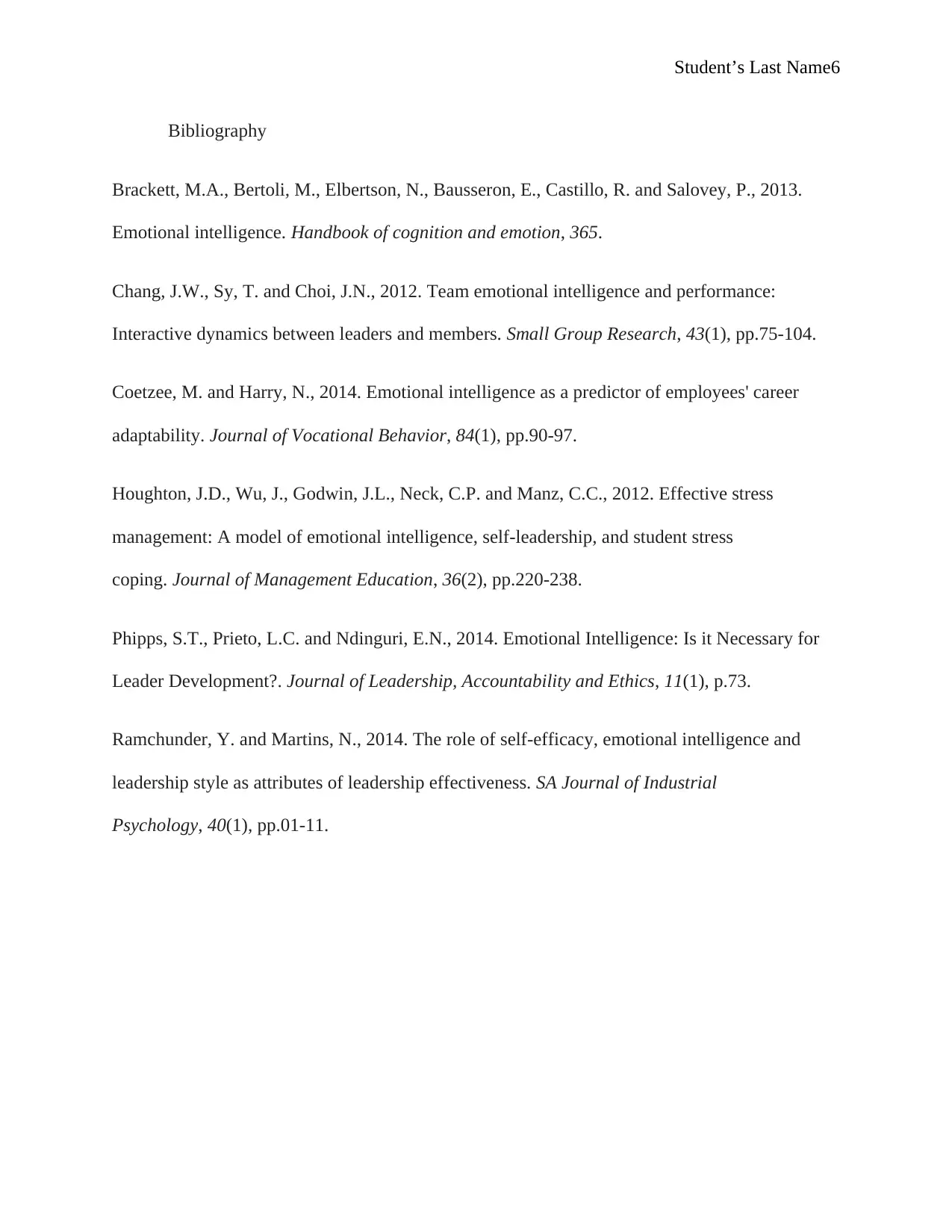
Student’s Last Name6
Bibliography
Brackett, M.A., Bertoli, M., Elbertson, N., Bausseron, E., Castillo, R. and Salovey, P., 2013.
Emotional intelligence. Handbook of cognition and emotion, 365.
Chang, J.W., Sy, T. and Choi, J.N., 2012. Team emotional intelligence and performance:
Interactive dynamics between leaders and members. Small Group Research, 43(1), pp.75-104.
Coetzee, M. and Harry, N., 2014. Emotional intelligence as a predictor of employees' career
adaptability. Journal of Vocational Behavior, 84(1), pp.90-97.
Houghton, J.D., Wu, J., Godwin, J.L., Neck, C.P. and Manz, C.C., 2012. Effective stress
management: A model of emotional intelligence, self-leadership, and student stress
coping. Journal of Management Education, 36(2), pp.220-238.
Phipps, S.T., Prieto, L.C. and Ndinguri, E.N., 2014. Emotional Intelligence: Is it Necessary for
Leader Development?. Journal of Leadership, Accountability and Ethics, 11(1), p.73.
Ramchunder, Y. and Martins, N., 2014. The role of self-efficacy, emotional intelligence and
leadership style as attributes of leadership effectiveness. SA Journal of Industrial
Psychology, 40(1), pp.01-11.
Bibliography
Brackett, M.A., Bertoli, M., Elbertson, N., Bausseron, E., Castillo, R. and Salovey, P., 2013.
Emotional intelligence. Handbook of cognition and emotion, 365.
Chang, J.W., Sy, T. and Choi, J.N., 2012. Team emotional intelligence and performance:
Interactive dynamics between leaders and members. Small Group Research, 43(1), pp.75-104.
Coetzee, M. and Harry, N., 2014. Emotional intelligence as a predictor of employees' career
adaptability. Journal of Vocational Behavior, 84(1), pp.90-97.
Houghton, J.D., Wu, J., Godwin, J.L., Neck, C.P. and Manz, C.C., 2012. Effective stress
management: A model of emotional intelligence, self-leadership, and student stress
coping. Journal of Management Education, 36(2), pp.220-238.
Phipps, S.T., Prieto, L.C. and Ndinguri, E.N., 2014. Emotional Intelligence: Is it Necessary for
Leader Development?. Journal of Leadership, Accountability and Ethics, 11(1), p.73.
Ramchunder, Y. and Martins, N., 2014. The role of self-efficacy, emotional intelligence and
leadership style as attributes of leadership effectiveness. SA Journal of Industrial
Psychology, 40(1), pp.01-11.
⊘ This is a preview!⊘
Do you want full access?
Subscribe today to unlock all pages.

Trusted by 1+ million students worldwide
1 out of 6
Your All-in-One AI-Powered Toolkit for Academic Success.
+13062052269
info@desklib.com
Available 24*7 on WhatsApp / Email
![[object Object]](/_next/static/media/star-bottom.7253800d.svg)
Unlock your academic potential
Copyright © 2020–2026 A2Z Services. All Rights Reserved. Developed and managed by ZUCOL.
